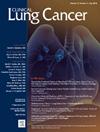Genetic Ancestry and Lung Cancer in Latin American Patients: A Crucial Step for Understanding a Diverse Population
IF 3.3
3区 医学
Q2 ONCOLOGY
引用次数: 0
Abstract
Lung cancer is the second leading cause of cancer-related deaths in Latin America. While incidence and mortality rates are higher in other populations, the ``Hispanic paradox'' observed in US Hispanics reflects a lower mortality rate for mortality from non-small cell lung cancer (NSCLC) despite socioeconomic disparities, which may be related to epigenetic and cultural factors. Genetic studies have identified single nucleotide polymorphisms associated with ancestry as key contributors to lung cancer risk and outcomes, emphasizing the importance of genomic insights for early detection and personalized treatments. This narrative review explores the impact of genetic ancestry on lung cancer in Hispanic/Latino populations. We searched MEDLINE and Google Scholar for “((SNP) OR (germline) OR (variant)) AND (lung cancer) AND ((Hispanic) OR (Latin)),” focusing on Latin American studies. We included articles published up to December 2024. Specific variation in genes such as XRCC1, CYP1A1, CYP1A2, SEMA3B, PADPRP, and mEPHX have been associated with increased lung cancer risk. Lung cancer incidence and prognosis vary significantly among Hispanics due to their diverse genetic ancestry. Understanding ancestry-specific genetic variations may help personalize treatment and improve outcomes for this population.
拉丁美洲患者的遗传祖先和肺癌:了解多样化人群的关键一步。
肺癌是拉丁美洲癌症相关死亡的第二大原因。虽然其他人群的发病率和死亡率较高,但在美国西班牙裔人群中观察到的“西班牙裔悖论”反映了尽管社会经济差异,但非小细胞肺癌(NSCLC)死亡率较低,这可能与表观遗传和文化因素有关。遗传学研究已经确定了与祖先相关的单核苷酸多态性是肺癌风险和结果的关键因素,强调了基因组对早期发现和个性化治疗的重要性。这篇叙述性综述探讨了遗传祖先对西班牙裔/拉丁裔人群肺癌的影响。我们在MEDLINE和谷歌Scholar上搜索“(SNP) OR(种系)OR(变体)and(肺癌)and(西班牙裔)OR(拉丁裔)”,重点关注拉丁美洲的研究。我们收录了截止到2024年12月发表的文章。XRCC1、CYP1A1、CYP1A2、SEMA3B、PADPRP和mEPHX等基因的特异性变异与肺癌风险增加有关。西班牙裔肺癌的发病率和预后因其不同的遗传血统而有显著差异。了解特定的遗传变异可能有助于个体化治疗和改善这一人群的预后。
本文章由计算机程序翻译,如有差异,请以英文原文为准。
求助全文
约1分钟内获得全文
求助全文
来源期刊

Clinical lung cancer
医学-肿瘤学
CiteScore
7.00
自引率
2.80%
发文量
159
审稿时长
24 days
期刊介绍:
Clinical Lung Cancer is a peer-reviewed bimonthly journal that publishes original articles describing various aspects of clinical and translational research of lung cancer. Clinical Lung Cancer is devoted to articles on detection, diagnosis, prevention, and treatment of lung cancer. The main emphasis is on recent scientific developments in all areas related to lung cancer. Specific areas of interest include clinical research and mechanistic approaches; drug sensitivity and resistance; gene and antisense therapy; pathology, markers, and prognostic indicators; chemoprevention strategies; multimodality therapy; and integration of various approaches.
 求助内容:
求助内容: 应助结果提醒方式:
应助结果提醒方式:


